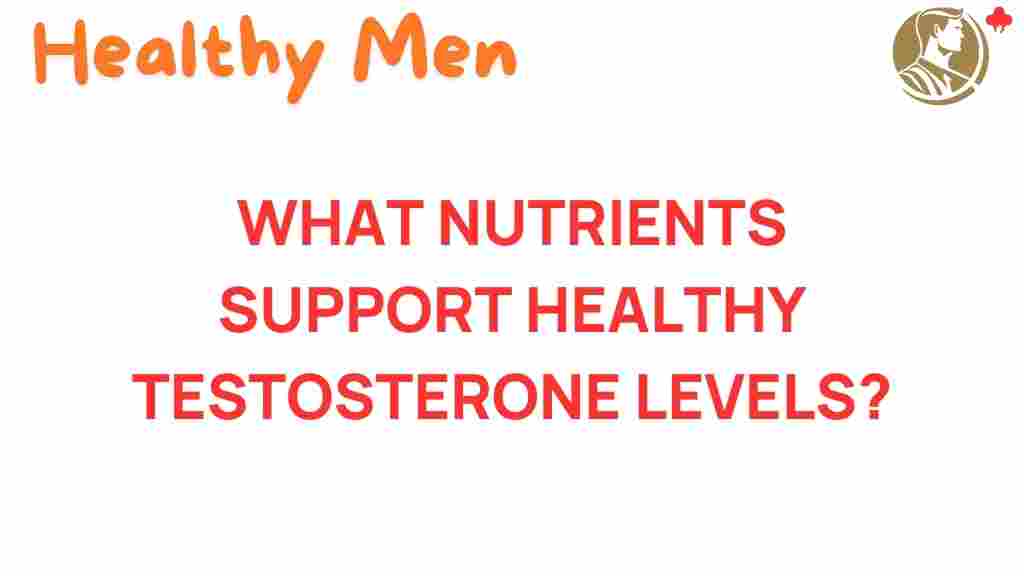Unlocking the Secrets: Nutrients That Boost Testosterone Levels
Testosterone is a vital hormone in the human body, playing a key role in various bodily functions, including muscle mass, fat distribution, and overall health. As men age, testosterone levels naturally decline, which can lead to a range of health issues, including reduced energy, decreased libido, and increased body fat. Fortunately, there are specific nutrients that can help boost testosterone levels naturally. In this article, we will explore these nutrients, how they impact testosterone production, and how you can incorporate them into your diet and lifestyle to enhance your health and wellness.
The Importance of Testosterone for Health and Wellness
Testosterone is often associated with masculinity, but it is essential for both men and women. It influences various aspects of health, including:
- Muscle Mass: Testosterone promotes muscle growth and strength.
- Bone Density: It helps maintain bone strength, reducing the risk of osteoporosis.
- Fat Distribution: Testosterone influences how the body stores fat.
- Mood and Energy Levels: Healthy testosterone levels contribute to a positive mood and higher energy.
- Libido: It plays a crucial role in sexual desire and performance.
Understanding the nutrients that can positively impact testosterone production is crucial for anyone looking to improve their fitness, health, and overall lifestyle.
Essential Nutrients for Boosting Testosterone
Several nutrients have been shown to influence testosterone levels. Here are some of the most important ones:
1. Zinc
Zinc is a vital mineral that plays a significant role in testosterone production. Low levels of zinc are linked to reduced testosterone levels. Foods rich in zinc include:
- Oysters
- Red meat
- Poultry
- Beans
- Nuts
Consider incorporating zinc supplements if dietary sources are insufficient, but consult a healthcare provider first.
2. Vitamin D
Vitamin D is crucial for overall health and has been associated with testosterone levels. Many men have insufficient vitamin D levels, particularly those who do not get enough sunlight. You can boost your vitamin D intake by:
- Spending time in sunlight
- Eating fatty fish (like salmon and mackerel)
- Consuming fortified foods (such as milk and cereals)
- Taking vitamin D supplements
3. Omega-3 Fatty Acids
Omega-3 fatty acids are essential fats that promote heart health and may also help increase testosterone levels. Sources of omega-3s include:
- Fish oil
- Flaxseeds
- Walnuts
- Chia seeds
Including these foods in your diet can support hormone health and overall wellness.
4. Magnesium
Magnesium is another critical mineral that can enhance testosterone levels. Studies suggest that magnesium supplementation can boost testosterone, especially in individuals with low levels. Foods high in magnesium include:
- Leafy greens (like spinach and kale)
- Nuts and seeds
- Whole grains
- Dark chocolate
5. B Vitamins
B vitamins, particularly B6 and B12, are essential for energy production and hormonal balance. Foods rich in B vitamins include:
- Meat
- Poultry
- Fish
- Eggs
- Dairy products
Ensuring adequate intake of B vitamins can support testosterone levels and overall health.
How to Incorporate These Nutrients into Your Diet
Incorporating these nutrients into your diet is easier than you might think. Here’s a step-by-step guide:
Step 1: Evaluate Your Current Diet
Start by analyzing your current dietary habits. Are you consuming enough of the foods listed above? Keep a food diary for a week to track your intake of key nutrients.
Step 2: Focus on Whole Foods
Prioritize whole foods rich in the essential nutrients for testosterone production. Aim to include:
- Lean proteins (chicken, fish, legumes)
- Healthy fats (avocado, olive oil, nuts)
- Fruits and vegetables (aim for a variety of colors)
- Whole grains (quinoa, brown rice, oats)
Step 3: Consider Supplements
If you struggle to meet your nutrient needs through diet alone, consider supplements. Consult with a healthcare professional to determine the best supplements for your specific needs, such as:
- Zinc supplements
- Vitamin D supplements
- Omega-3 fish oil capsules
- Magnesium supplements
Step 4: Stay Hydrated
Staying hydrated is essential for overall health and wellness. Aim to drink plenty of water throughout the day, as dehydration can negatively impact hormone levels.
Step 5: Maintain a Balanced Lifestyle
Along with diet, lifestyle factors play a significant role in testosterone levels. Incorporate regular physical activity, manage stress through mindfulness or yoga, and prioritize sleep to support hormonal balance.
Common Troubleshooting Tips
If you’re struggling to boost your testosterone levels, consider the following troubleshooting tips:
- Assess Your Stress Levels: High stress can lead to elevated cortisol levels, which may inhibit testosterone production. Practice stress management techniques.
- Get Enough Sleep: Aim for 7-9 hours of quality sleep each night, as poor sleep can decrease testosterone levels.
- Limit Alcohol Intake: Excessive alcohol consumption can negatively impact testosterone levels. Moderation is key.
- Consult a Healthcare Professional: If you suspect low testosterone levels, speak to a doctor for testing and personalized advice.
Conclusion
Boosting testosterone levels naturally is possible by focusing on the right nutrients and making lifestyle changes. By incorporating foods rich in zinc, vitamin D, omega-3 fatty acids, magnesium, and B vitamins into your diet, you can support your hormone health and overall wellness. Remember to evaluate your current dietary habits, maintain a balanced lifestyle, and consult with healthcare professionals when needed. Empower yourself with the knowledge of how diet and nutrients can enhance your fitness and health journey.
For more information on testosterone and health, check out this comprehensive guide on hormones. Remember, taking small steps towards a healthier diet and lifestyle can lead to significant changes in your overall well-being.
This article is in the category Nutrition and created by healthymen Team
